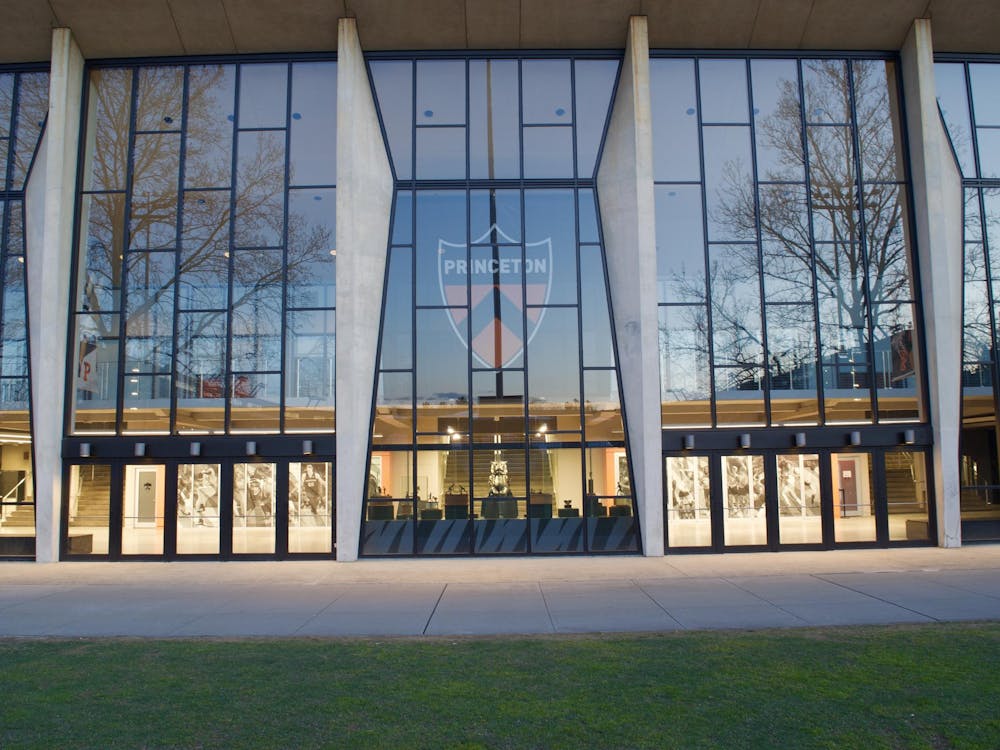Before speaking on campus Tuesday, BuzzFeed COO and president Jon Steinberg ’99 sat down with The Daily Princetonian to discuss his memories from Princeton, his position at the helm of one of the Internet’s most popular media companies and advice for current Princetonians.
The Daily Princetonian: When you wrote for the Opinion section of the ‘Prince,’ did you know that you would end up working at an online media company? How did your experience writing for the ‘Prince’ inform your career now?
Jon Steinberg: I wish I understood more about the web — it was still relatively new then … I was there from 1996 to 1999, and I don't think we even had the ‘Prince’ online then. There was a standalone publication that was called the Spigot, run by a few people. It was starting it out a little bit, just trying to get distribution; we all had websites where we could post stuff. But I don't think I really understood how transformative the web could be to how people got news and information.
And I always loved writing. I write a fair amount now, both internally and also from a blogging standpoint about our business; I write on LinkedIn a fair amount. But you know I just always loved writing ... My thesis is actually all about participation in a more civic society as a result of online engagement. I was very interested in the web, even then. I always loved computers; I always loved technology; I always loved the internet. I don’t think I necessarily knew that I would go into media; I didn't know that it would all intersect that way. But these were things that I was interested in even when I wrote my thesis. And my thesis was kind of not relevant for a lot of years, and it started to get relevant again.
DP: At what point in your career did you want to go into a field that was specifically BuzzFeed-related?
JS: When I met Jonah Peretti, the founder of BuzzFeed, and I heard about his vision for what he wanted to build. And he was just coming off the Huffington Post success. He had such a unique set of skills in terms of building a big media property, and he had such a vision for the way that Facebook, Twitter, Reddit and all these other networks would allow people to share and spread content. That, coupled with the fact that we really had a shared vision of how to develop a business around it. I joined when we were 15 people and had six million monthly visitors to the site, and today we have over 300 employees, we just moved into a new office, we have 50 million YouTube views a month on our videos. That, and the site has 85 million monthly visitors. It’s just been a miraculous journey in a lot of ways — one that I have been very lucky to be part of.
DP: In your view, where do you place BuzzFeed on the spectrum of Facebook, Twitter, Huffington Post, Reddit, Tumblr — sites like those?
JS: I think we are the leading social news and entertainment company. I think we're a media, politics, business, entertainment and technology source that really understands “the social,” the way the content gets spread, and I think we write for a much younger audience. 60 percent of our audience, of our readers, are 18-34. That’s much younger than most newspapers. So I think we're the most modern of the news sources out there. What’s interesting is that, for people brought up on the web, all this stuff is culture and entertainment.
DP: BuzzFeed is often known for the more entertaining, cultural articles, lists and media. Then there is another side of BuzzFeed that has the more political, news-based reporting — more journalistic, perhaps. How is BuzzFeed managing the two sides? How do you view these two aspects?
JS: I mean, that's always [the case] in media, right? NBC has lots of sitcoms … and it has the nightly news. So every media property has a mix of entertainment and hard news. We just have a type of entertaining content that's more relevant to the culture of the times … There always needs to be a dispersion of content all across the spectrum of entertainment and hard news. We’re no different than NBC or ABC or CBS in that regard — just that everything we do is much younger.
DP: So as BuzzFeed continues to grow, what part of BuzzFeed are you looking to expand? Is it the journalistic side?
JS: Yeah. We just opened our U.K. bureau. We've got five or six people there. We do six million visitors a month. Australia, we just announced. We have a whole foreign and world affairs section now, so we will continue to get more global. Video has been a huge area of investment for us as well. We have a big facility in L.A. with about 40 employees; a large percentage of it is focused on video content. So we're building a media company and all the things that go with doing that — including global, world affairs coverage. We’re profitable now, so that gives us the ability to finance our own growth. So we're really just following in the footsteps of great media companies like Hearst or Conde Nast — just updated 100 percent digital.

DP: Going back to Princeton, in one of your opinion columns for the 'Prince,' you wrote, “Our focus should be less on doing well and more on doing good,” in reference to the time students spend at Princeton. Looking back, do you have specific recommendations, now, for a Princeton student?
JS: I think it is really important to spend your time on what you’re passionate about and what you want to do. I know that sounds cliche and that’s the advice that everyone gives when they come back to campus … I just don't find that most advice people give young people to be that useful. Stuff about managing people, and operating a company, and how to scale, and how to deal with tough choices — that's stuff that I think I have direct experience that I can speak about in a very tactical manner. But I think people need to give less advice, to be honest with you. Most of the advice I was given about doing this company was wrong, or the opposite of what I should have been doing. So I kind of had to figure that out on my own. But in terms of how to treat people, how to work with people — that was stuff that was helpful for me to hear about.
I try to figure out ways to give advice. When you look at all the people who have made dramatic changes in things, they all tend to be very young people. I'm increasingly of this opinion that people who do the most innovative stuff in business or social programs or things like that are going to have a life cycle of professional athletes. Your 20s and 30s are when you do what you're going to do, and then you’re kind of out of the game, I feel, by the time you hit your 40s and certainly by the time you hit your 50s. So I think it’s a very limited amount of time that you have to make an impact and do what you want to do ... Everything is more competitive, everything is faster, and when you get out of Princeton, you’ve got 20 short years to make your mark — especially if you're going to be in technology, media or entertainment.
DP: To the Princetonians that will be going into the digital media or technology world, do you have any more advice you want to share regarding this specific area?
JS: I think that studying history is really important. If you read the history of newspapers and you read the history of cable networks, there’s a lot of mistakes to be avoided by studying history. So that's particularly important to me. That, and also trusting my own instincts and trusting my own study of things as opposed to listening. I mean, if I had listened to what everybody told me while we were getting going with BuzzFeed, we would have been running banner ads. Jonah and I just didn't want to do that. We thought that there was a much better form of advertising to do, something that would work much better. We hadn't worked in the industry before, and we hadn't sold banners before, so we weren't stuck with that legacy conception. So I think it's really important we leave legacy notions behind and we can come up with things that strike you as logical from your own perspective —no matter how naive that perspective may be. Because I think naivete can be really valuable when combined with hard work and logic.
DP: On Sunday, our new President [Christopher] Eisgruber had his presidential installation ceremony, and he echoed what former President [Shirley] Tilghman championed, which was the value of a liberal arts education. What are your views on the value of a liberal arts education in our world today?
JS: I'm not totally sold on the value of a college education in general, to be honest with you. I loved my time at Princeton. I learned an exceptional amount there, but I think if you're going to get a college education, it has to be something you really want to do and that you’re excited about. Doing it because it’s something that everybody does is the wrong impulse, and I think there are lots of choices available to people — ranging from volunteering time, or getting an internship and doing something along those lines, or self-study, or online education. I just think the world is wide open with choices right now, and given the cost of a college education, given that most people don’t graduate college with applicable skills to any job, [a college education] has to be something that on its own merits, a person wants to do. I'm not saying that people shouldn’t get college degrees. I’m saying that people should get a college degree because they want to study at college — not because it is a guarantee of anything. Because a college degree is no longer a guarantee of anything.
DP: So in our society today, some of the more visible entrepreneurs are those who have not received a college diploma, and some even encourage dropping out of college. Where do you stand on that?
JS: I think that two generations ago, if you went to a school like Princeton, you were guaranteed of an amazing job when you got out. That was just the way the world worked. I think I was one of the last generations where it really made a huge difference. When people apply to come work at BuzzFeed right now, I don’t really care where they went to college. It doesn’t really indicate anything to me. I care about what are their passions, what have they done, what have they written, what have they created? Just having gone to a great school doesn’t come with any directly applicable skills. So when you’re at Princeton for four years, you are going to derive pleasure and benefit from learning, but you've got to do something else. You’ve got to tie in some other way to position yourself to do what you want to do when you get out of there. Just going to classes and getting good grades is not enough.








